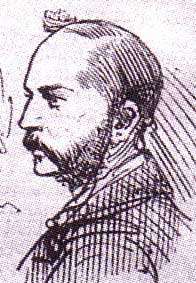On Friday 6th March 1885, the Pall Mall Gazette brought its readers the dreadful news that an attempt had been made to blow up a police station in the East End of London.
Now, of course, 1885 was three years before the Jack the Ripper murders occurred.

However, in 1885, the Metropolitan Police were battling a different type – though equally menacing and deadly – of villain in the form of the dynamiters who were conducting a terrorist bombing campaign across the capital.
There had, so the article reported, also been a threat against the police officer who would be charged with heading the hunt for Jack the Ripper in 1888, Inspector Frederick George Abberline.
The headline in the Pall Mall Gazette read:-
REPORTED DESIGN TO BLOW UP A POLICF STATION INSPECTOR ABBERLINE’S LIFE THREATENED
The subsequent article provides a snapshot of a long ago occurrence on Commercial Road and gives an intriguing insight into how dismissive individual police constables could be of witnesses whom they felt weren’t worth paying particular attention to:-
A MAN APPROACHED A WOMAN
“Last night, about ten o’clock, a respectably dressed woman entered the Commercial-road police station, Whitechapel, and stated that a few minutes previously a man had stopped her in a back street near the police-station and asked if she would like to earn a good sum for doing a slight service for him.
OFFERED HER TWO SOVEREIGNS
He then showed her two sovereigns which, he said, he would give her on condition that she placed a parcel which he had in his hand in the doorway of the police-station.
He said that because she was a woman, no one would take any notice of her, and as soon as she had laid down the parcel she was to get away from the spot as quickly as she could, or the consequences would be far worse to her than she could imagine.
SHE REFUSED
This statement somewhat alarmed her, and as she suspected the man, “who had the appearance and brogue of an Irish man, and was wearing a slouched hat,” of some evil intent, she refused to have anything to do with him.
He then said, “Oh, if you don’t want to earn two sovereigns easily I can soon get some one who will be glad to do it,” and walked quickly away, holding the parcel, which appeared to be a tin box wrapped in brown paper, carefully in one hand.
SHE TOLD A POLICE MAN
At that moment she saw a policeman, to whom she told what had occurred, and pointed out the man, who was fast disappearing in the distance.
The policeman, however, refused to credit her statement, and only laughed at her.
NO SIGN OF THE MAN
After questioning the woman, the authorities were satisfied that her statement was correct, and a number of constables were immediately sent to try and find the man in question, but of course by that time he had got clear away.
All the policemen who came in from duty were next questioned by the inspector, but each of them denied any knowledge of having seen the woman.
Strict watch was kept all night on the station and its precincts, but nothing of a suspicious character transpired.
INSPECTOR ABBERLINE THREATENED
It is also stated that Inspector Abberline, of the Criminal Investigation Department, who has been instrumental in getting up evidence against Burton and Cunningham, has received several letters of late threatening him with death. The letters purport to have been signed on behalf of a society of men who have pledged themselves to avenge the arrest of the two men in question.”
Not only does this article provide us with an insight into some of the dangers that Londoners were facing prior to the onslaught of the Whitechapel Murders, but it also gives us an insight how the work of officers, such as Inspector Abberline, had already made them the target of all manner or cranks and extremist groups.
